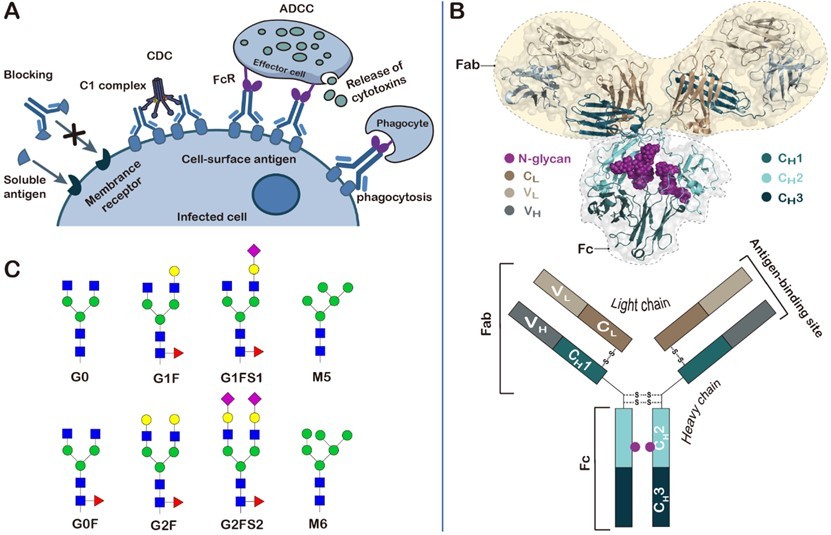Therapeutic Protein Glycoengineering Services
Glycoengineering of Therapeutic Protein
Therapeutic proteins, such as antibodies and hormones, have become essential tools for preventing and treating a wide range of diseases. Most therapeutic proteins undergo glycosylation, which plays a pivotal role not only in ensuring the proper folding and functionality of these proteins but also in exerting a profound impact on their pharmacokinetics, pharmacodynamics, and overall therapeutic effectiveness. To enhance the properties of therapeutic proteins, glycoengineering has emerged as a valuable method. It involves the deliberate modification of glycosylation patterns to enhance stability, solubility, and biological activity while reducing potential immunogenicity or other associated side effects.
 Fig.1 Function, structure and glycosylation of antibodies.1
Fig.1 Function, structure and glycosylation of antibodies.1
Therapeutic Protein Glycoengineering Services at Creative Biolabs
Leveraging extensive experience in Glycoengineering Services, Creative Biolabs has developed comprehensive glycoengineering platforms for the production of therapeutic proteins with custom-modified glycan patterns. Our glycoengineering platforms encompass cell-based genetic and metabolic engineering, chemoenzymatic engineering, and even cell-free synthesis services tailored for in vitro glycoprotein production. By employing cutting-edge techniques for glycosylation manipulation, we are committed to offering high-quality glycoengineering services to enhance the properties of therapeutic protein products with various applications.
Cell-based Genetic Glycoengineering
Therapeutic proteins can be produced from various expression systems like mammals, bacteria, yeast, plants, and insects. We employ multiple genetic approaches like knockout/knockin, knockdown, and overexpression to manipulate glycosylation pathways in these systems, enhancing the properties of glycoprotein products. For instance, knocking out the FUT8 gene leads to the production of non-fucosylated antibodies with increased ADCC (antibody-dependent cell-mediated cytotoxicity). The introduction of two extra glycosylation sites into human erythropoietin (hEPO) significantly increases the circulation time.
Cell-based Metabolic Glycoengineering
Metabolic engineering is available across the mentioned expression systems. Through supplementation with various monosaccharide precursors that undergo metabolic processing, we produce glycans with non-natural chemical groups or enhanced glycoforms, such as increased sialylation, to significantly extend the serum half-life of therapeutic proteins. Additionally, specific glycosylation inhibitors in supplementation reduce the production of undesirable and immunogenic glycans, ensuring the safety of protein therapeutics.
Chemoenzymatic Glycoengineering
Our chemoenzymatic glycoengineering approach enables the precise introduction of specific glycan modifications into protein therapeutics produced in diverse expression systems. This involves using various glycosidases, including exo-glycosidases and endo-glycosidases, as well as glycosyltransferases to remodel the glycan patterns. such as the generation of highly homogeneous antibody glycoforms.
In vitro glycoengineering strategies can precisely control protein glycosyl modifications, making customized glycosyl modifications possible. Moreover, this technology is applied to different types of proteins, including therapeutic proteins, enzymes, antibodies, etc., with a wide range of applications. We provide high-quality in vitro glycoengineering services to clients around the world, which is an effective way to improve therapeutic proteins and help maintain the safety and effectiveness of therapeutic drugs. In addition, we also provide a variety of reactive sugars and glycosyltransferase products for rapid in vitro glycosylation of therapeutic proteins.
Cell-free Synthesis
Chemical glycoprotein synthesis leverages solid-phase peptide synthesis to directly introduce glycosylated amino acids into peptides. This innovative method enables us to synthesize a diverse range of therapeutic glycoproteins featuring custom-designed glycosylation sites and glycan structures, including both N- and O-glycans, and empowers us to improve the properties and efficacy of therapeutic protein, offering tailored solutions to meet specific therapeutic goals.
Types of Therapeutic Proteins for Glycoengineering Include But Are limited to:
Enzymes are of great significance as therapeutic proteins for glycoengineering because they play key roles in sugar metabolism and synthesis, so specific types of enzymes are used as therapeutic proteins to modulate or intervene in sugar-related biochemical reactions. For example, by introducing enzymes with specific functions, the sugar metabolism process is regulated to treat certain diseases. Creative Biolabs is committed to providing clients with high-quality enzyme-based glycoengineering services through a mature glycoengineering platform.
Glucocerebrosidase (GCD) is essential for normal metabolism and nervous system functions of the body, and lack of effective GCD may cause various genetic diseases. Creative Biolabs has developed a comprehensive therapeutic protein glycoengineering platform, we provide specialized mammalian and plant systems-based bio-better glucocerebrosidase glycoengineering service. We have developed stable cell lines expressing glucocerebrosidase with mannose-terminal N-glycans, enhancing its biological activity and therapeutic efficacy.
Creative Biolabs changes the glycosyl structure of glucarpidase according to client needs and develops bio-better's glucarpidase through glycoengineering services, which helps enhance its therapeutic effect and provide patients with safer and more effective treatment options. We construct a diverse glucarpidase library through the glycoengineering platform, and transform the appropriate recombinant expression vector into E. coli, screen and express functional bio-better glucarpidase.
-
Blood factors
-
Vaccines
-
Difficult-to-express glycoproteins
Advantages of Our Services
-
Comprehensive platforms for therapeutic protein glycoengineering
-
Various strategies in each glycoengineering platform
-
Cutting-edge techniques for manipulating glycosylation processes
-
Production of therapeutic proteins with significantly enhanced properties and efficacy
-
Custom-designed glycoengineering for specific therapeutic needs
-
Professional team with extensive experience in glycoengineering
Glycosylation profoundly affects protein stability, activity, and immunogenicity. The glycosylation patterns of biopharmaceuticals must be meticulously controlled during development and production and can be engineered to achieve desired properties in protein therapeutics. Creative Biolabs has been at the forefront of developing glycoengineering platforms for therapeutic proteins, providing customized solutions to meet specific therapeutic requirements in biopharmaceutical development. If you have any requirements related to therapeutic protein glycoengineering, please don't hesitate to contact us for more information.
Reference
-
Chen, Baoquan, et al. "Impact of N-linked glycosylation on therapeutic proteins." Molecules 27.24 (2022): 8859. Distributed under Open Access license CC BY 4.0, without modification.
For Research Use Only.
Related Services

 Fig.1 Function, structure and glycosylation of antibodies.1
Fig.1 Function, structure and glycosylation of antibodies.1

